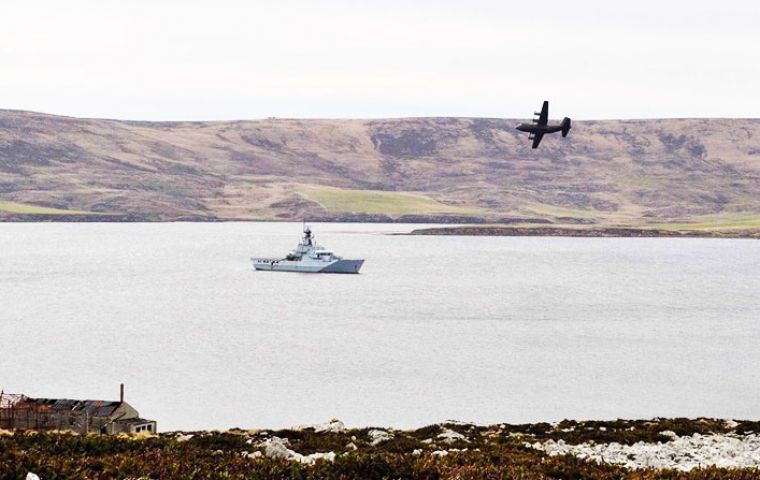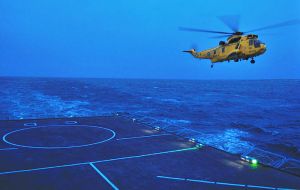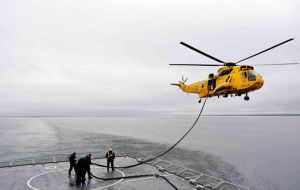MercoPress. South Atlantic News Agency
Falklands' patrol HMS Clyde tested in full operational exercises
 Clyde is visited by â Albertâ whilst at anchor off Ajax Bay.(Pic RN)
Clyde is visited by â Albertâ whilst at anchor off Ajax Bay.(Pic RN)  Two procedural flying exercises were then conducted, including night flying giving Clyde the all important ‘Safe’ assessment.
Two procedural flying exercises were then conducted, including night flying giving Clyde the all important ‘Safe’ assessment.  One of Clyde’s most important capabilities to assist the Search and Rescue flight is that of Helicopter In Flight Refueling (HIFR).
One of Clyde’s most important capabilities to assist the Search and Rescue flight is that of Helicopter In Flight Refueling (HIFR). September and early October has been a busy five weeks for the smallest ship in the Royal Navy with a flight deck. HMS Clyde is tasked with patrolling the Falkland Islands whilst also monitoring the airspace that covers the wider area, and routinely visits the many small settlements that feature around the Islands.
September kicked off with a visit from the ‘Trappers’, the Flag Officer Sea Training Aviation team, who provide the external assurance that Clyde is safe to conduct aviation operations.
The ship had her Aviation facilities inspected, routines checked and the worst case scenario of a crash on deck was put through a ‘Table Top Tactics’ exercise, before a full crash exercise scenario was run out on a chilly September afternoon.
Two procedural flying exercises were then conducted, including night flying giving Clyde the all important ‘Safe’ assessment.
With the tests were successfully passed, Clyde’s busy program has seen her flight deck visited by the British International helicopters that provide a lift and shift facility for military personnel and stores around the Falkland Islands.
They also saw frequent over-flights by ‘Albert’ the RAF C130 Hercules that conducts Maritime Reconnaissance Patrols for Commander British Forces in the Falklands, and took part in exercises with Fleet Air Arm colleagues, the Lynx flight from HMS Iron Duke.
With her work around the Falkland Islands forming part of a Joint Operational Environment, Clyde regularly exercises with both the Army and RAF in order to maximize UK's combined capabilities.
One of Clyde’s most important capabilities to assist the Search and Rescue flight is that of Helicopter In Flight Refueling (HIFR).
She can refuel an aircraft if it is too rough to land on deck, Clyde’s flight deck team can connect a fuel hose to the aircraft winch, which is then winched up and fitted into the fuelling point on the aircraft.
The flight deck team can then pump fuel from the ship and top up the helicopter’s tanks without the aircraft setting a wheel on the deck.
This capability is practiced regularly and is of vital importance on long Search and Rescue missions – Clyde can extend the range of helicopter much further out to sea than would ordinarily be possible without a ‘filling station’ being available. (RN)




Top Comments
Disclaimer & comment rules-

-

-

Read all commentsHerrrumph, wibble wibble wibble, Militarising the South Atlantic, wibble dink blurhhh.
Oct 18th, 2014 - 02:50 pm 0I had to slip this in anywhere i could.
Oct 18th, 2014 - 03:42 pm 0These men fight like they play ! https://www.youtube.com/watch?v=xvA0-N1YgLU&feature=youtu.be
And... Here's the RGs http://youtu.be/_ZQnE2jEU_c Boloudos!
Oct 18th, 2014 - 04:22 pm 0Bahahahaha
Commenting for this story is now closed.
If you have a Facebook account, become a fan and comment on our Facebook Page!